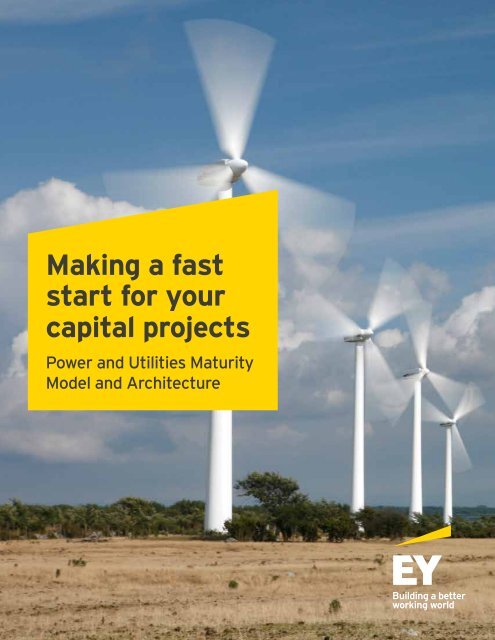Making a fast start for your capital projects
2dfita2
2dfita2
You also want an ePaper? Increase the reach of your titles
YUMPU automatically turns print PDFs into web optimized ePapers that Google loves.
<strong>Making</strong> a <strong>fast</strong><br />
<strong>start</strong> <strong>for</strong> <strong>your</strong><br />
<strong>capital</strong> <strong>projects</strong><br />
Power and Utilities Maturity<br />
Model and Architecture
The situation<br />
Infrastructure is in a period of high investment; global power<br />
and utility organizations are <strong>for</strong>ecast to spend >US$5t in the next<br />
10 years to improve their infrastructure assets. Such significant<br />
investment is being driven by rapid population growth and<br />
increased urbanization, and the increased demand <strong>for</strong> resources<br />
such as water, food and energy that this creates.<br />
With the increasing volume of <strong>capital</strong> <strong>projects</strong> in the pipeline<br />
and their increasingly complex nature, there is greater demand<br />
and competition <strong>for</strong> finance. To secure <strong>capital</strong> investment,<br />
infrastructure organizations must be able to act <strong>fast</strong> to establish<br />
<strong>projects</strong> that are set up <strong>for</strong> success, while providing shareholder<br />
confidence that their funds are invested wisely to maximize rates<br />
of return at the lowest possible levels of risk.<br />
The Capital Projects Power and Utilities Maturity Model and<br />
Architecture (PUMMA) provides an opportunity to enable this<br />
“<strong>fast</strong> <strong>start</strong>” <strong>for</strong> <strong>your</strong> project while reducing the risk of having<br />
an inadequate and incomplete set of policies and processes to<br />
effectively govern, manage and deliver the project to plan. Using<br />
PUMMA, Project Directors can help their business quickly identify<br />
the key capabilities needed through the life of the project, decide<br />
when these are required and determine whether they will be built<br />
in-house or bought as a service from trusted partners.<br />
Project Directors are well placed to understand their businesses’<br />
needs and to put in place the correct blend of processes,<br />
technology, in<strong>for</strong>mation and people needed to successfully<br />
manage these <strong>projects</strong> through design, construction and into<br />
operations.<br />
2 <strong>Making</strong> a <strong>fast</strong> <strong>start</strong> <strong>for</strong> <strong>your</strong> <strong>capital</strong> <strong>projects</strong>
The issues<br />
Few <strong>capital</strong> <strong>projects</strong> to date deliver to time and budget. EY’s<br />
research has found that mega <strong>projects</strong> typically have budget<br />
over runs of 35% with an average delay of 2 years. There are a<br />
number of factors which drive these overruns:<br />
Misaligned decision-making<br />
• The investment case rationale provides the basis <strong>for</strong> the project<br />
to exist. Poor understanding of the investment case levers<br />
will result in decisions being made that will put delivery of the<br />
investment case at risk.<br />
Absence of key capabilities<br />
• Each project is different, so while core capabilities remain<br />
common between <strong>projects</strong>, these need setting up at the<br />
required level of maturity, and at the right time so that they can<br />
run like clockwork and don’t hinder delivery.<br />
• As the complexity of mega<strong>projects</strong> increases, so does the need<br />
<strong>for</strong> specialist capabilities critical to delivery. Failure to determine<br />
from the outset which should be developed internally, versus<br />
those that can be brought in through joint ventures or third<br />
parties, will delay their acquisition and increase the cost of<br />
their uptake.<br />
Lack of collaboration and integration<br />
• With the increasing reliance on joint ventures and third parties,<br />
identifying the integration points <strong>for</strong> processes and systems<br />
beyond organizational boundaries is a critical factor to restrain<br />
the different ways of working, organizational siloes and differing<br />
cultures that could threaten effective project execution.<br />
Power and Utilities Maturity Model Architecture<br />
3
The imperative<br />
Global demand <strong>for</strong> infrastructure is at unprecedented levels,<br />
fueled by global megatrends in urbanized population growth and<br />
the need to replace and replenish older, outdated infrastructure.<br />
This alone increases the pressure on the infrastructure sector<br />
to deliver, but is further exacerbated by other technological,<br />
economic and social factors:<br />
• Access to <strong>capital</strong> to fund these large <strong>projects</strong> is proving<br />
increasingly difficult with a slowdown in economic growth.<br />
To improve the viability of <strong>projects</strong>, we are seeing an increasing<br />
number of joint ventures and negotiated guaranteed rates of<br />
return as instruments used to secure valuable investment into<br />
critical infrastructure programs.<br />
• The increased investment in <strong>capital</strong> <strong>projects</strong> and potential<br />
impacts to the balance sheet or public purse is bringing<br />
additional scrutiny from investors, regulators and government<br />
bodies.<br />
• An aging infrastructure work<strong>for</strong>ce means that organizations<br />
have to understand the capabilities they need to sustain to<br />
maintain the required knowledge to improve investor confidence<br />
that risks are effectively managed to deliver the project to plan.<br />
• The movement toward a new digital economy, with building<br />
in<strong>for</strong>mation modeling becoming an industry requirement, is<br />
driving a paradigm shift in the infrastructure sector. Project<br />
organizations have to understand how they will benefit from<br />
the novel capabilities they need to build or buy to compete in an<br />
evolving market.<br />
“The current generation of infrastructure<br />
<strong>projects</strong> are more complex than ever<br />
be<strong>for</strong>e, rely on capabilities that did not<br />
exist in a pre-digital era, and are being<br />
executed at a time of reduced access<br />
to <strong>capital</strong> and an increased need <strong>for</strong><br />
transparency around risks.”<br />
Chris Lewis<br />
Partner, Ernst & Young LLP<br />
4 <strong>Making</strong> a <strong>fast</strong> <strong>start</strong> <strong>for</strong> <strong>your</strong> <strong>capital</strong> <strong>projects</strong>
The effect<br />
Over the course of any project, unplanned events can have a significant material impact on delivery. How <strong>your</strong> project responds to<br />
these events to make accurate decisions in a collaborative, integrated way using the appropriate capabilities is essential <strong>for</strong> aligning<br />
the supply chain ef<strong>for</strong>ts to get the project back on track.<br />
• What is <strong>your</strong><br />
organization’s risk<br />
threshold?<br />
• What are the risks to<br />
project success and<br />
are they monitored at<br />
the right level?<br />
• What will be the<br />
impact if something<br />
goes wrong?<br />
• How do you share<br />
and develop<br />
designs across <strong>your</strong><br />
supply chain while<br />
maintaining its<br />
integrity?<br />
• How does <strong>your</strong><br />
project monitor the<br />
quality of critical<br />
components through<br />
manufacturing?<br />
• How do you maintain<br />
alignment and control of<br />
the design, scope, cost,<br />
schedule and quality<br />
across a large and complex<br />
number of stakeholders?<br />
• How do you access and<br />
use accurate in<strong>for</strong>mation<br />
to update the investment<br />
case, and stakeholder<br />
reporting and testing prior<br />
to commissioning?<br />
• How will asset in<strong>for</strong>mation<br />
be captured, mastered<br />
and sustained from<br />
construction through to<br />
operations?<br />
• How can you use this<br />
in<strong>for</strong>mation to reduce<br />
the amount of unplanned<br />
outages?<br />
Feasibility and<br />
planning<br />
Design/procure and<br />
project set-up<br />
Construct and<br />
commission<br />
Operate and<br />
maintain<br />
Decommission<br />
• Is this project a<br />
one-off or are there<br />
future programs<br />
within <strong>your</strong> portfolio?<br />
• Are the capabilities<br />
you need now the<br />
same as those you will<br />
need in the future?<br />
• Do you have a plan<br />
to develop the<br />
capabilities that you<br />
need?<br />
• How will the supply<br />
chain handle the<br />
anticipated volume of<br />
design changes during<br />
construction?<br />
• How do you maintain<br />
visibility of commercial<br />
agreements<br />
dependencies,<br />
liabilities and potential<br />
impacts across a<br />
complex supply chain?<br />
• How do you confirm<br />
that you have the right<br />
equipment and materials<br />
ready on-site?<br />
• How do you use realtime<br />
in<strong>for</strong>mation to drive<br />
decisions and optimize<br />
delivery?<br />
• When a request <strong>for</strong><br />
in<strong>for</strong>mation (RFI) <strong>for</strong><br />
non-con<strong>for</strong>mance<br />
occurs, how will you<br />
resolve this in a timely<br />
manner?<br />
• How do you confirm<br />
that what you are<br />
operating has been<br />
built using the correct<br />
design and quality<br />
standards?<br />
• How can you use<br />
the digital asset to<br />
optimize the physical<br />
one?<br />
• How do you design <strong>for</strong><br />
decommissioning?<br />
• How do you set<br />
up <strong>your</strong> finance<br />
structure to fund<br />
decommissioning<br />
through operating<br />
income?<br />
Power and Utilities Maturity Model Architecture<br />
5
The fix<br />
Typical methods to improve <strong>capital</strong> project per<strong>for</strong>mance look to iterate existing practices and standards. PUMMA will help you<br />
look ahead and identify the core capabilities that you need throughout <strong>your</strong> project and how these could be delivered differently to<br />
achieve the value defined in the investment case.<br />
Our method involves five key steps that turn business insight into accelerated design:<br />
Identifying<br />
investment case<br />
drivers<br />
Identifying the<br />
factors that will have<br />
a material impact on<br />
<strong>your</strong> ability to deliver<br />
the investment case<br />
and raising awareness<br />
of these across <strong>your</strong><br />
organization<br />
Determining<br />
the capabilities<br />
you need<br />
Determining how<br />
you will set up the<br />
organization to deliver<br />
the investment case<br />
Defining the<br />
capabilities to<br />
build<br />
Deciding what you<br />
will keep in-house<br />
and where you will<br />
partner with other<br />
organizations<br />
Enabling<br />
end-to-end<br />
integration<br />
Determining how to<br />
align <strong>your</strong> processes<br />
and systems across<br />
business functions to<br />
deliver the required<br />
level of per<strong>for</strong>mance<br />
Empowering<br />
data-driven<br />
decisions<br />
1 2 3 4 5<br />
Establishing how you<br />
will provide consistent<br />
and accurate<br />
in<strong>for</strong>mation to enable<br />
better-in<strong>for</strong>med<br />
decisions<br />
Business insight<br />
Accelerated design<br />
6 <strong>Making</strong> a <strong>fast</strong> <strong>start</strong> <strong>for</strong> <strong>your</strong> <strong>capital</strong> <strong>projects</strong>
The bottom line<br />
With an increasingly competitive and constrained landscape,<br />
<strong>capital</strong> and infrastructure organizations need to be agile and in<br />
control from planning to delivery.<br />
Identifying the people, processes, systems and in<strong>for</strong>mation you<br />
need today, tomorrow and through the life of <strong>your</strong> project has<br />
never been more important to provide a “<strong>fast</strong> <strong>start</strong>” to reduce the<br />
time to achieve the final investment decision (FID) and long-term<br />
project delivery success.<br />
“PUMMA will help accelerate<br />
the setup up of <strong>your</strong> project<br />
organization and give confidence<br />
you have the right tools in place<br />
when you need them”<br />
Craig Hoggett<br />
Partner, Ernst & Young LLP<br />
PUMMA integrated business design accelerator<br />
Business strategic drivers<br />
The “top 10” principles that will guide the successful development of the business<br />
Project investment case<br />
The key levers to drive value and deliver the project on time and to cost<br />
Capability model<br />
What the business does and which capabilities need to be developed in-house<br />
Process model and scenarios<br />
How the business works in a joined-up way to deliver from end-to-end<br />
Change and readiness road map<br />
The changes required and the plan to roll out and embed the new ways of working<br />
Change System & Readiness model Roadmap<br />
The changes The logical required applications and the plan needed to roll to automate -out and embed and enable the new the processes ways of working<br />
1001<br />
00011<br />
01101<br />
01101<br />
Data model<br />
How the in<strong>for</strong>mation enables decisions and flows through systems and processes<br />
Power and Utilities Maturity Model Architecture<br />
7
Want to learn more<br />
Stephen Church<br />
Partner<br />
Energy<br />
Ernst & Young LLP<br />
+44 16 1333 3039<br />
schurch1@uk.ey.com<br />
Chris Lewis<br />
Partner<br />
Energy<br />
Ernst & Young LLP<br />
+ 44 20 7951 5085<br />
clewis2@uk.ey.com<br />
Craig Hoggett<br />
Partner<br />
Energy<br />
Ernst & Young LLP<br />
+44 20 7951 4207<br />
choggett@uk.ey.com<br />
Julian Keates<br />
Executive Director<br />
Energy<br />
Ernst & Young LLP<br />
+44 20 7951 7273<br />
jkeates@uk.ey.com<br />
EY | Assurance | Tax | Transactions | Advisory<br />
About EY<br />
EY is a global leader in assurance, tax, transaction and advisory<br />
services. The insights and quality services we deliver help build<br />
trust and confidence in the <strong>capital</strong> markets and in economies the<br />
world over. We develop outstanding leaders who team to deliver<br />
on our promises to all of our stakeholders. In so doing, we play a<br />
critical role in building a better working world <strong>for</strong> our people, <strong>for</strong><br />
our clients and <strong>for</strong> our communities.<br />
EY refers to the global organization, and may refer to one or more,<br />
of the member firms of Ernst & Young Global Limited, each of<br />
which is a separate legal entity. Ernst & Young Global Limited, a UK<br />
company limited by guarantee, does not provide services to clients.<br />
For more in<strong>for</strong>mation about our organization, please visit ey.com.<br />
© 2016 EYGM Limited.<br />
All Rights Reserved.<br />
EYG no. 02016-164Gbl<br />
BMC Agency<br />
GA 0000_06738<br />
ED None<br />
In line with EY’s commitment to minimize its impact on the environment, this<br />
document has been printed on paper with a high recycled content.<br />
This material has been prepared <strong>for</strong> general in<strong>for</strong>mational purposes only and is not<br />
intended to be relied upon as accounting, tax, or other professional advice. Please refer to<br />
<strong>your</strong> advisors <strong>for</strong> specific advice.<br />
ey.com<br />
Dinesh Sathianathan<br />
Senior Manager<br />
Energy<br />
Ernst & Young LLP<br />
+44 20 7951 3598<br />
dsathianathan@uk.ey.com<br />
Neil Evans<br />
Senior Manager<br />
Energy<br />
Ernst & Young LLP<br />
+44 20 7951 0478<br />
nevans1@uk.ey.com<br />
Will Clayton<br />
Manager<br />
Energy<br />
Ernst & Young LLP<br />
+44 16 1333 2944<br />
wclayton@uk.ey.com




